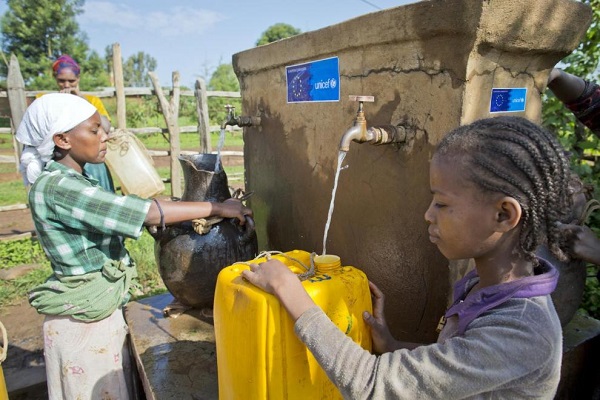
A new report released today by UNICEF and WHO has revealed that globally, women are primarily responsible for fetching water for households, while girls bear this responsibility nearly twice as often as boys and spend more time doing it each day.
The report, titled “Progress on household drinking water, sanitation and hygiene (WASH) 2000-2022: Special focus on Gender,” provides the first comprehensive analysis of gender inequalities in WASH. It also highlighted that women and girls are more likely to feel unsafe using a toilet outside the home and bear the brunt of poor hygiene conditions.
UNICEF director of WASH and CEED, Cecilia Sharp emphasised the impact of unsafe water, toilets and handwashing on girls’ potential, well-being and perpetuation of poverty. She stated, “Responding to girls’ needs in the design and implementation of WASH programs is critical to reaching universal access to water and sanitation and achieving gender equality and empowerment.”
The report revealed that globally, 1.8 billion people live in households without water supplies on their premises. In 7 out of 10 such households, women and girls aged 15 and older are responsible for water collection, compared to 3 out of 10 households for their male counterparts. Girls under 15 are also more likely than boys under 15 to fetch water. Women and girls often make longer journeys to collect water, sacrificing their time for education, work, leisure and risking physical injuries and dangers along the way.
Additionally, over half a billion people still share sanitation facilities with other households, compromising women’s and girls’ privacy, dignity and safety. Recent surveys from 22 countries indicate that among households with shared toilets, women and girls are more likely than men and boys to feel unsafe walking alone at night and face sexual harassment and other safety risks.
The report further highlights the health risks faced by women and girls due to inadequate WASH services, particularly during their menstrual periods. Women and adolescent girls in the poorest households and those with disabilities are most likely to lack a private place to wash and change.
WHO director of the environment, climate change and health department, Dr. Maria Neira emphasised the health risks faced by women and girls due to inadequate WASH services, including infectious diseases and vulnerabilities to harassment, violence and injury when they have to go outside the home for water or toilet use.
The report also sheds light on the disproportionate impact of inadequate access to hygiene on women and girls. As they are primarily responsible for domestic chores and caregiving, they are exposed to diseases and health risks without proper handwashing facilities. The additional time spent on domestic chores can limit girls’ educational opportunities and employment prospects.
Although there has been progress in achieving universal access to WASH, with increases in household access to safely managed drinking water, safely managed sanitation and basic hygiene services, achieving the Sustainable Development Goal target by 2030 requires a significant acceleration in progress.
Efforts are needed to ensure that progress on WASH contributes to gender equality. This includes integrating gender considerations in WASH programmes and policies, collecting and analysing disaggregated data to inform targeted interventions addressing the specific needs of women, girls and other vulnerable groups.

